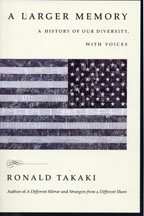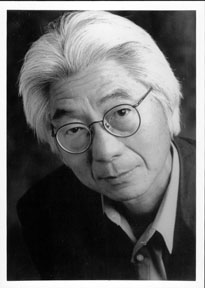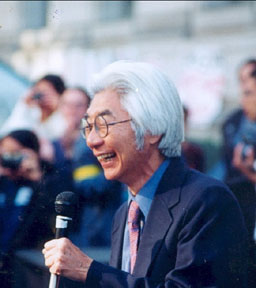
| Lane Home Page | Search Lane |
| Contact RT | Website Accessibility |

| Event Scrapbook | ||
| Evaluations | ||
| About Reading Together | ||
| Reading Together in Past Years | ||
| Contact Us | ||
| Reading Togther Main Page | ||
Books | News | Calendar | Scrapbook
A Larger Memory:
A History of Our Diversity, with Voices

Noted historian Ronald Takaki believes that history is comprised of story—many stories, and he dedicates his book to those stories and the multiplicity of voices which tell them. Takaki journeys back in time to the early days of our country’s history to find the voices we have not heard in our traditional history books—the Chinese who built the railroads, Africans who were the foundation of young (and later not so young) America’s economic power, Mexican-Americans whose labor enabled our country’s agricultural abundance. He moves into the present, and we hear the stories of our country today—a multi-ethnic, multi-racial country in which privilege is conferred on some and reserved from others. We hear how perceived difference is used to create strife among the very groups who should be banding together in common cause. With a combination of his own insightful analysis, set beside a dynamic interplay of diverse voices, Takaki brings a larger America to life. This America is an America with all its warts, promises—broken and kept, inequities, and opportunity. Takaki’s book tells the story of a country constantly changing, shifting, stumbling forward, lurching back, then optimistically moving forward again.
 |
BIOGRAPHY |
 |
| Ron Takaki is one of the most preeminent scholars of our nation’s diversity. He is a professor of Ethnic Studies at the University of California, Berkeley, where he has taught for over 30 years.
Born in 1939, Takaki is the grandson of immigrant Japanese plantation workers in Hawaii. He graduated from the College of Wooster, Ohio, in 1961. Six years later, after receiving his Ph.D. in American history from UC Berkeley, Takaki went to UCLA to teach its first Black history course. While there, he helped to found its centers for African American, Asian American, Mexican American, and Native American studies. In 1972, Takaki returned to Berkeley to teach in the newly instituted Department of Ethnic Studies. He served as department chair from 1975-77. His course, Ethnic Studies 130, “The Making of Multicultural America: A Comparative Historical Perspective,” provided the conceptual framework for the B.A. program and the Ph.D. program in Comparative Ethnic Studies as well as for the university’s multicultural requirement for graduation, known as the American Cultures Requirement. The Berkeley faculty has honored Takaki with a Distinguished Teaching Award. In 1988, Takaki was awarded the Goldwin Smith University Lectureship at Cornell University, and in 1993, Cornell’s Distinguished Messenger Lectureship, the university’s most prestigious lecturer appointment. Professor Takaki is the author of 11 books. They include significant titles: A Different Mirror: A History of Multicultural America (Little, Brown, 1993) is the winner of numerous prizes, including the American Book Award. Publishers Weekly hailed the book as a “brilliant revisionist history of America that is likely to become a classic of multicultural studies.” Hiroshima: Why America Dropped the Atomic Bomb (Little, Brown, 1995) offers the first study to examine the significance of race in Harry Truman’s fateful decision. Double Victory: A Multicultural History of America in World War II (Little, Brown, 2000) is the only study of the “Greatest Generation” from the perspectives of our nation’s diverse racial and ethnic minorities. Debating Diversity: Clashing Perspectives on Race and Ethnicity in America (Oxford, 2002) highlights the intellectual disagreements between Takaki and Frederick Jackson Turner, Nathan Glazer, and Arthur Schlesinger, Jr. Takaki has been on national television to discuss issues of race, U.S.-Japan relations, multiculturalism, affirmative action, etc. The programs include the NBC “Today Show,” ABC “This Week with David Brinkley,” CNN “International Hour,” “Cross Fire,” “Jim Lehrer Newshour.” In 1980, the University of Wisconsin invited Takaki and Nathan Glazer to debate the issue of affirmative action. Since then, the two of them have had debates at Michigan State University in 1994, Berkeley in 1995, and the University of Pudget Sound in 1996. In 1997, Takaki was invited by the Council on Foreign Relations to debate Arthur Schlesinger, Jr., at the opening plenary session of its conference on America’s diversity and America’s foreign policy. Takaki has lectured in Japan, Russia, Armenia, New Zealand, the Netherlands, Austria, and South Africa. He has been awarded honorary doctorates from Wheelock College, the College of Wooster, Macalester College, and Northeastern University. In June 2004, he will be awarded an honorary doctor of humanities from the University of Massachusetts. He was also honored by the 2003 Fred Cody Lifetime Achievement Award, and by the 2003 UC Alumni Association’s Award for Excellence in Achievement. In 1995, Takaki attended two seminars on race at Vice President Al Gore’s home to advise him; in 1997, he attended a White House meeting with President Bill Clinton to help brainstorm ideas for his major speech, “One America in the 21st Century: The President’s Initiative on Race.” The Los Angeles Times has described Takaki as a “minority Everyman. He is a rare hybrid, a multicultural scholar.” |
||
Lane Community College - Reading Together |
